GREENEVILLE – Tusculum University students showcased their research, writing and art skills during the annual Academic Symposium, which illuminates the active and experiential learning they receive from professors who work one-on-one with them and mentor them.
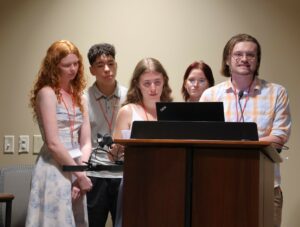
Students make a history presentation. They are, left to right, Thelma Clapp, Jayden Thomas, AnnaLee Simpson, Lily Burgner and Chris Colmer.
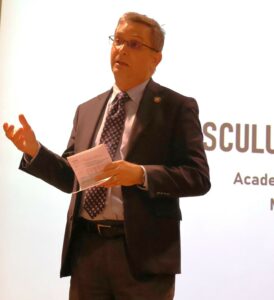
Dr. Scott Hummel makes remarks at the symposium.
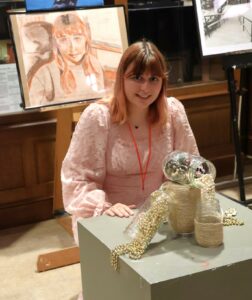
Hannah Morgan crouches by her art.
Students across multiple programs on Friday, May 2, presented their research, read their award-winning writing and displayed multiple forms of art they had created. The event in the Meen Center enabled faculty, staff and community members to listen to well-crafted presentations and ask questions of the students.
The symposium also provided an opportunity for Dr. Scott Hummel, Tusculum’s president, to tout the quality of education at the university and the way it prepares students for graduate-level studies.
“You have some really outstanding faculty,” he told the students. “It is not common to have faculty who are great teachers and researchers but also engage their students in undergraduate research. You will find evidence of that approach at our Academic Symposium. As a result, you have produced the type of work that takes place in graduate school.”
Dr. Hummel said he has talked to alumni who have gone to graduate schools at other institutions and asked them how well Tusculum prepared them. He shared an alumnus’ story that he was in an excellent position in graduate school based on his undergraduate experience at Tusculum. That alumnus said many of his fellow graduate students had gone to much larger universities for their undergraduate degree but had not developed the type of strong relationships with their professors that are available at Tusculum.
That alumnus recognized he had obtained a graduate-level experience and education while he was an undergraduate student at Tusculum. He realized he was better prepared for graduate school than about any of his other new classmates.
“I’m proud of our students and proud of our faculty,” Dr. Hummel said.
Faculty member’s role

Dr. Suzanne Byrd, left, stands with four presenters from sport science programs. They are, left to right, Alyssa Barbrick, Helena Walts, Maia Scott and Zoe Sharpe.
Five students in the various sport science programs presented their research during the symposium. Dr. Suzanne Byrd, professor of sport science, said the best way for her to help students learn how to perform research is to require them to dive into it with guidance from her. Students who have gone to graduate school or professional school have returned to express they were glad they learned how to conduct research during their studies.
Many research options are available to sport science students. These include literature review, qualitative research and quantitative research, all of which are designed to answer a specific question. Students are eligible to pick their own topics.
“Because we are putting students into professional schools and because those schools require research in their studies, it is imperative that we teach them how to go through that process,” Dr. Byrd said. “I’m a stickler with the student product. Students have to use APA styling and formatting, follow the proper methods for connecting themes and conducting the research and potentially work with the university’s Institutional Review Board. They have to know all of these items to be successful at a professional or graduate school.”
Student perspectives
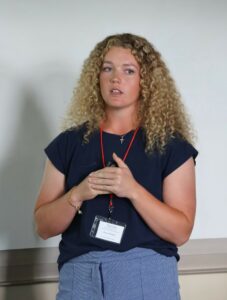
Student Alyssa Barbrick makes her presentation.
Alyssa Barbrick is about to graduate with a bachelor’s degree in sport science pre-physical therapy/occupational therapy and then head to physical therapy school. She presented her research topic titled “How Can Physical Therapy Treatment Programs Help Alleviate Symptoms for Parkinson’s Patients?”
“I’ve really enjoyed seeing the different aspects of the disease and with therapy that I had not known before,” she said. “There have been a lot of different things that I have learned through research that have been interesting to see and dig deeper and have that aha moment, where I say, ‘That makes sense.’”
When she first arrived at Tusculum, her mind was not focused on research, but she quickly realized in one of her first classes with Dr. Byrd that she would soon participate in that academic exercise. She said research has benefited her education by making her more well-rounded and able to think for herself. She feels ready for the next chapter in physical therapy school.
“At the beginning, you think about all of the work you will have to conduct with research, but once you dive deeper into it, it becomes enjoyable and turns into a treasure hunt,” Barbrick said. “Your thinking is, ‘I need to find these sources, and I’m going to get the bottom of what I am looking for.’”
Jori Ray, a junior seeking a degree in environmental science, presented two posters at the symposium. He teamed with classmates Katie Campbell, Jessie Carolin-Vandenberg, Dare Crusade and Caleb Swinehart on “Pollinator Garden and Wetland Biodiversity Enhancement Project on Tusculum University Campus” and with Crusade on “North American Beavers: Impacts on Water Quality in College Creek.”

Dr. Robert Gall, left, talks about the poster created by Nathan West, middle, and Felipe Velasquez Quintana, second from the left. Also in the photo are Walter Wimberly, right, and Steve Anderson, second from the right.
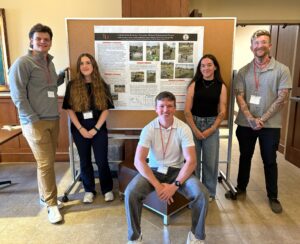
Jori Ray, middle, joins his classmates who worked with him on his posters. They are, left to right, Caleb Swinehart, Katie Campbell, Jessie Carolin-Vandenberg and Dare Crusade.
He began research at Tusculum in his sophomore year and will perform more during the summer at the Savannah Corridor Site. He loves research because he can examine a subject that appeals to him in a greater manner. Dr. Melissa Burt, assistant professor of environmental science, played a large role in helping him become part of the symposium.
When he completes his studies, he wants to serve as a field biologist or field zoologist so he can work hands-on in the field and in the lab with different organisms. He wants to work with large mammals and will receive practical experience during the summer working with researchers tagging wild boars.
“Research wasn’t my main interest when I began,” Ray said. “I was into field work, but once I got into writing and researching, it just made the field work more interesting. I got to take back what I learned from the field and put it into words on paper. Presenting at the symposium is helping me get out of my comfort zone a lot more than I used to.”
Nathan West, a senior who is majoring in computer science, collaborated with fellow student Felipe Velasquez Quintana on the poster titled “Comparing AI Models: Claude, DeepSeek and ChatGPT in Efficiency and Quality.” He is enjoying conducting research and said the project on which he presented has gone well.
“AI is a big thing,” he said. “Everybody uses it, so it was quite interesting to research it in greater detail than what you would learn from just using it. It was fun. It helped me also to plan my time better and identify the key things I would want to research, what I think people would find the most interesting and the most important information to obtain.”
Symposium leader’s viewpoint

Olivia Nanney shows her art.
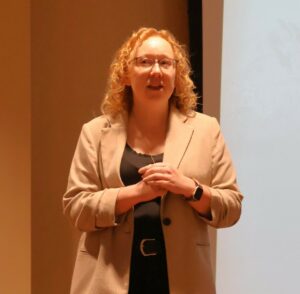
Dr. Katherine Smith speaks during the symposium.
Dr. Katherine Smith, professor of psychology, who led the symposium with Dr. Peter Noll, professor of public history and museum studies, said she would like students to have some takeaways from presenting at the symposium.
“I hope it has built their confidence in their subject matter because this is their time to shine, their time to show everybody what they have learned and what they done,” she said. “I hope that is providing them with the idea that they are experts in their field, that they have really learned their subject and they can apply their knowledge and take it forward. I also hope it’s a good practice for them before they go to the next step – whether that is graduate school, medical school or into a career.”
In addition to discussing their own work, students heard a presentation from alumnus Joe Calloway, who graduated from Tusculum in 2023 with a bachelor’s degree in environmental science. Calloway spoke about his work on the Chucky madtom, a critically endangered fish. Dr. Susan Monteleone, professor of biology, said he has become one of Tennessee’s leading experts on this fish through research and work experience.
In the early stages of his career, Calloway has already worked with the Tennessee Wildlife Resources Agency, Ripley’s Aquarium of the Smokies and the U.S. Forest Service. He has also cultivated important partnerships with Tennessee Tech University, the Tennessee Aquarium Conservation Institute and the Conservation Fishery. When he was a Tusculum student, he and one of his classmates, Breanna Mathes, discovered a potential new species of crayfish on campus.
To learn more about the university, please visit www.tusculum.edu.


